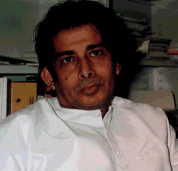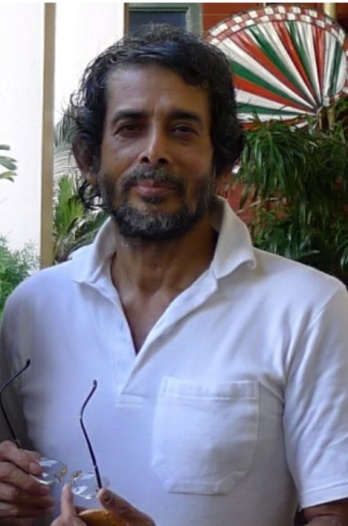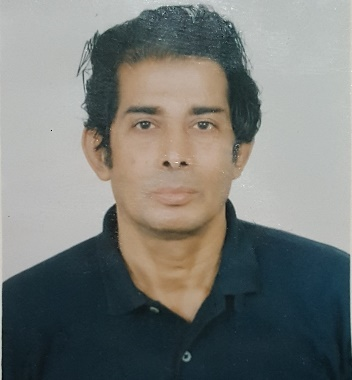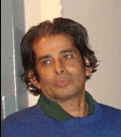This encyclopedia provides a brief biography of a legendary scientist Dr. Dipankar Chakraborti. Dr. Chakraborti pioneered arsenic research in the Ganga Meghna Brahmaputra Basin and dedicated his entire life to researching and serving arsenic-affected communities in India and Bangladesh.
- Arsenic
- India
- Bangladesh
- Scientist
- Legend
- Dr. Dipankar Chakraborti
 Dr. Dipankar Chakraborti was a man known for his dedication to his work, and that is how he would have preferred it. He pioneered surface arsenic and fluoride contamination in groundwater in India and Bangladesh. The former Director of the School of Environmental Studies (SOES) at Jadavpur University, Kolkata, West Bengal, India, the information on his studies far outnumbers than that on his personal life. Having originally started his research career as an environmental analytical chemist in the United States and other western countries, finally, he decided to return to Kolkata, West Bengal, India, permanently during late 1986 to intimate the scientific world about the widespread arsenic calamity in the Indian subcontinent as well as to assist the villages in their widespread issue of arsenic toxicity, which he continued till his untimely demise in 2018.
Dr. Dipankar Chakraborti was a man known for his dedication to his work, and that is how he would have preferred it. He pioneered surface arsenic and fluoride contamination in groundwater in India and Bangladesh. The former Director of the School of Environmental Studies (SOES) at Jadavpur University, Kolkata, West Bengal, India, the information on his studies far outnumbers than that on his personal life. Having originally started his research career as an environmental analytical chemist in the United States and other western countries, finally, he decided to return to Kolkata, West Bengal, India, permanently during late 1986 to intimate the scientific world about the widespread arsenic calamity in the Indian subcontinent as well as to assist the villages in their widespread issue of arsenic toxicity, which he continued till his untimely demise in 2018.
Dr. Chakraborti was born on October 29, 1943, in Barapaika, located in the Barisal district of the then undivided Bengal of India, presently known as Bangladesh. As the family relocated to Khejurtala in Faridpur district (Bangladesh), he grew up there until moving to Kolkata in the West Bengal state of India in 1949. He earned his Bachelor's and Master's degrees in Chemistry from Calcutta University and Jadavpur University (Kolkata, West Bengal, India). After completing his Master's degree in1966, he joined Jadavpur University as an Assistant Professor. He earned his Ph.D. degree in Analytical Chemistry from the same university in 1973. He was a UNESCO Fellow at the University of Prague (Czech Republic) in 1977. Between 1978 and 1981, he worked with Prof. Freddy Adams as a researcher at the University of Antwerp, Belgium. He also worked with Professor Irgolich as a researcher at the Texas A & M University, USA, for two years between 1981 and 1983. Between 1984 and 1986, Dr. Chakraborti had been a visiting scientist at the University of Antwerp, Belgium.
He became the Director of the School of Environmental Studies (SOES), Jadavpur University, Kolkata, in 1988. Gradually he established an internationally recognized Arsenic Research Team (including medical personnel) at SOES and started investigating the groundwater Arsenic contamination and its health effects in West Bengal, utilizing his vast experiences, expertise, and achievements acquired earlier in Europe and USA. He served as the founding Director and research director until 2008 although thereafter, he remained bonded with his brain-child SOES until his sudden demise on February 28, 2018, at the age of 74. The school became the first in the area to offer a Master's degree in Environmental Science. It was initially an evening course being converted to a day course later on. To date, SOES is dedicated to educating those with backgrounds in science and engineering, focusing on environmental issues.
 Dr. Chakraborti's passion led to his success and fame, but it was not without active self-advocacy. Due to his scientific activities on arsenic, he obtained international recognition. He discovered arsenic contamination and highlighted arsenic problems for both West Bengal, India, and Bangladesh. As an early advocate for the issue, many did not believe him until he organized an international conference on arsenic contamination in Kolkata during 1995 that received media coverage of the attendees going on a field visit to see the vicious effects of arsenic first hand. His work to promote awareness and education and provide solutions increased as he realized how widespread and grave the arsenic problem was. Throwing himself into his work was inevitable, and he felt a family was formed at his institute through everyone's combined drive. Gradually he converted the School of Environmental Studies (SOES) of Jadavpur University into a self-funded institution with autonomy. Dr. Chakraborti analyzed arsenic for common people all over India free of cost and would personally help many arsenic-affected families financially. In his lifetime, he analyzed more than 400,000 water and biological samples from arsenic-affected villages of West Bengal, Jharkhand, Bihar, Uttar Pradesh, Assam, Manipur, and Chhattisgarh of India. SOES helped many research organizations (national & international) analyze their arsenic samples at meager or free of cost. SOES analyzed about 54,000 water samples and 10,000 biological samples from Bangladesh free of charge. Until Dr. Chakraborti's demise, the SOES spent their money on arsenic research works as well as on the arsenic-affected families directly to help them live their everyday lives. Dr. Chakraborti suffered nothing other than frustration with government agencies for not taking the issue seriously, which stunted positive or beneficial changes that could have occurred much earlier. This was another reason why it was important for the SOES to be able to spend their money as they wanted. Despite a task that only became more overwhelming with time and the opposition to solutions he saw as highly plausible, Dr. Chakraborti found great joy and felt a great sense of achievement from his work.
Dr. Chakraborti's passion led to his success and fame, but it was not without active self-advocacy. Due to his scientific activities on arsenic, he obtained international recognition. He discovered arsenic contamination and highlighted arsenic problems for both West Bengal, India, and Bangladesh. As an early advocate for the issue, many did not believe him until he organized an international conference on arsenic contamination in Kolkata during 1995 that received media coverage of the attendees going on a field visit to see the vicious effects of arsenic first hand. His work to promote awareness and education and provide solutions increased as he realized how widespread and grave the arsenic problem was. Throwing himself into his work was inevitable, and he felt a family was formed at his institute through everyone's combined drive. Gradually he converted the School of Environmental Studies (SOES) of Jadavpur University into a self-funded institution with autonomy. Dr. Chakraborti analyzed arsenic for common people all over India free of cost and would personally help many arsenic-affected families financially. In his lifetime, he analyzed more than 400,000 water and biological samples from arsenic-affected villages of West Bengal, Jharkhand, Bihar, Uttar Pradesh, Assam, Manipur, and Chhattisgarh of India. SOES helped many research organizations (national & international) analyze their arsenic samples at meager or free of cost. SOES analyzed about 54,000 water samples and 10,000 biological samples from Bangladesh free of charge. Until Dr. Chakraborti's demise, the SOES spent their money on arsenic research works as well as on the arsenic-affected families directly to help them live their everyday lives. Dr. Chakraborti suffered nothing other than frustration with government agencies for not taking the issue seriously, which stunted positive or beneficial changes that could have occurred much earlier. This was another reason why it was important for the SOES to be able to spend their money as they wanted. Despite a task that only became more overwhelming with time and the opposition to solutions he saw as highly plausible, Dr. Chakraborti found great joy and felt a great sense of achievement from his work.
 Dr. Chakraborti authored nearly 300 articles in peer-reviewed journals, books, book chapters, and technical reports. Dipankar Chakraborti's enormous scientific merit is demonstrated through 18475 citations, 151 publications cited more than 10 times (i10 score), and an h-index of 62 till date (Source: Google Scholar). He was an integral part of the creation of the pyrite oxidation theory. A member of the World Health Organization group concerning the environment and arsenic as well as aiding the International Agency for Research on Cancer in risk evaluation of arsenic, he dedicated himself to spreading the word on the issues of arsenic. He raised awareness of the arsenic issue in the Bengal delta, which finally led concerned governments to address the issue appropriately. He continued to fight for solutions to be adopted on a government level. His research led to the replacement of ineffective arsenic test kits used by UNICEF. He organized five international conferences on groundwater's arsenic pollution, one in Kolkata (1995) while the other was in Bangladesh (Collaborated with Dhaka Community Hospital). He also discovered groundwater arsenic contamination in the Bihar state of India. He also declared the arsenic safe groundwater locations in Bangladesh based on his research data. Dr. Chakraborti had been invited to many countries worldwide for lectures on groundwater arsenic contamination, including Harvard University, MIT-USA. He had also joined as a collaborator with Harvard University to mitigate groundwater arsenic contamination in Bangladesh. Dr. Chakraborti was invited from PR China to set-up an environmental analytical laboratory at Hebei University. He was also an advisor to Asia Arsenic Network, Japan. Dr. Chakraborti had also been an Advisor to the American Chemical Society's environmental journal, Environmental Science & Technology. He never accepted any national/international aid/grant in an effort to keep the SOES self-sustained. He had guided fourteen students for the Ph.D., and all are well established worldwide. Research students from many countries, including Harvard University, USA, John Hopkins University School of Medicine, USA, Asia Arsenic Network, Japan, had joined SOES from time to time as visiting researchers for arsenic work. The 7th International Congress of Arsenic in the Environment and the Volume of Proceedings from the 2018 conference were both dedicated to him.
Dr. Chakraborti authored nearly 300 articles in peer-reviewed journals, books, book chapters, and technical reports. Dipankar Chakraborti's enormous scientific merit is demonstrated through 18475 citations, 151 publications cited more than 10 times (i10 score), and an h-index of 62 till date (Source: Google Scholar). He was an integral part of the creation of the pyrite oxidation theory. A member of the World Health Organization group concerning the environment and arsenic as well as aiding the International Agency for Research on Cancer in risk evaluation of arsenic, he dedicated himself to spreading the word on the issues of arsenic. He raised awareness of the arsenic issue in the Bengal delta, which finally led concerned governments to address the issue appropriately. He continued to fight for solutions to be adopted on a government level. His research led to the replacement of ineffective arsenic test kits used by UNICEF. He organized five international conferences on groundwater's arsenic pollution, one in Kolkata (1995) while the other was in Bangladesh (Collaborated with Dhaka Community Hospital). He also discovered groundwater arsenic contamination in the Bihar state of India. He also declared the arsenic safe groundwater locations in Bangladesh based on his research data. Dr. Chakraborti had been invited to many countries worldwide for lectures on groundwater arsenic contamination, including Harvard University, MIT-USA. He had also joined as a collaborator with Harvard University to mitigate groundwater arsenic contamination in Bangladesh. Dr. Chakraborti was invited from PR China to set-up an environmental analytical laboratory at Hebei University. He was also an advisor to Asia Arsenic Network, Japan. Dr. Chakraborti had also been an Advisor to the American Chemical Society's environmental journal, Environmental Science & Technology. He never accepted any national/international aid/grant in an effort to keep the SOES self-sustained. He had guided fourteen students for the Ph.D., and all are well established worldwide. Research students from many countries, including Harvard University, USA, John Hopkins University School of Medicine, USA, Asia Arsenic Network, Japan, had joined SOES from time to time as visiting researchers for arsenic work. The 7th International Congress of Arsenic in the Environment and the Volume of Proceedings from the 2018 conference were both dedicated to him.
Dr. Chakraborti's work was his life, or at least an immense part of it. He is survived by his supportive wife, Dr. Reena Chakraborty (former Associate Professor in Chemistry, Rammohan College, Kolkata) and a doting daughter Sanjana Chakraborty [(M.Phil, Economics, Jadavpur University) who presently has submitted her Ph.D. thesis in Economics from Jadavpur University, utilizing some extremely valuable 'groundwater arsenic contamination' database of her beloved father for her research work]. At the home front, he had been a very dutiful, caring, and loving husband as also a caring and doting father. Even with his love, he regretted missing much of his daughter's childhood due to the late hours he would work for. Despite his few hours of sleep, being very much health conscious, and being a strict yoga practitioner throughout, he was pretty physically healthy right up until his passing. Initially a nonvegetarian, but in later years, he preferred vegetarian food though he ate fish to appease his daughter whenever she asked. He strictly stayed away from "modern medicines." He was a good painter. A lover of plants and yoga, his office environment remained in the state of a sanctum, providing color and natural elements. He was seen as kind, generous, hardworking, and optimistic.
 Lastly, Dr. Chakraborti totally donated a huge and voluminous sum - his over-the-years' personal earnings earned through SOES, comprising of his award (international and national) money, consulting fees, the share of fees earned from environmental analytical analysis etc.etc. to Jadavpur University, earnestly urging the authority to establish and run an arsenic fund that would further carry on arsenic research in the future after his demise and help the arsenic-affected families as and when needed. Hopefully, in the near future, his unfulfilled dream (until now) perhaps might materialize one day and come true! Finally, he left his legacy to the world on February 28, 2018. In environmental science, posthumously, Dr. Chakraborti was selected as the one amongst the prestigious top 2% global scientists by Stanford University, USA; during 2020, his rank was 612. Indeed, he would ever remain as a symbol of a selfless, noble, and extremely kind human being as also an immortal scientist with encyclopedic knowledge on groundwater arsenic contamination!
Lastly, Dr. Chakraborti totally donated a huge and voluminous sum - his over-the-years' personal earnings earned through SOES, comprising of his award (international and national) money, consulting fees, the share of fees earned from environmental analytical analysis etc.etc. to Jadavpur University, earnestly urging the authority to establish and run an arsenic fund that would further carry on arsenic research in the future after his demise and help the arsenic-affected families as and when needed. Hopefully, in the near future, his unfulfilled dream (until now) perhaps might materialize one day and come true! Finally, he left his legacy to the world on February 28, 2018. In environmental science, posthumously, Dr. Chakraborti was selected as the one amongst the prestigious top 2% global scientists by Stanford University, USA; during 2020, his rank was 612. Indeed, he would ever remain as a symbol of a selfless, noble, and extremely kind human being as also an immortal scientist with encyclopedic knowledge on groundwater arsenic contamination!
The author of this encyclopedia has started the world's first scholarship on arsenic research, dedicated to Dr. Chakraborti. He is hopeful that the government of India will realize the invaluable contributions of Dr. Chakraborti to science and society and will acknowledge his legendary contributions.
